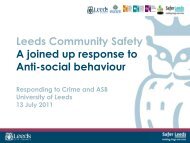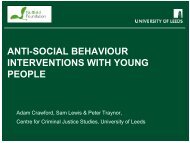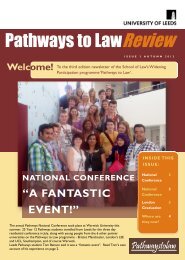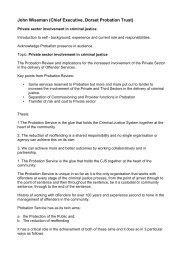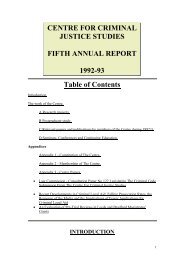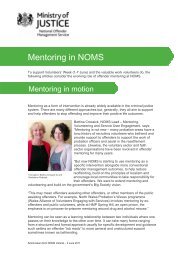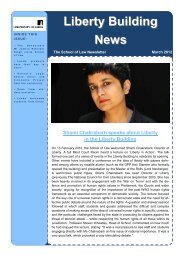Mentoring Adult Offenders: a silver bullet? - University of Leeds
Mentoring Adult Offenders: a silver bullet? - University of Leeds
Mentoring Adult Offenders: a silver bullet? - University of Leeds
- No tags were found...
Create successful ePaper yourself
Turn your PDF publications into a flip-book with our unique Google optimized e-Paper software.
Dr Anthea Hucklesby and Dr Emma WincupCentre for Criminal Justice Studies<strong>University</strong> <strong>of</strong> <strong>Leeds</strong>, UK
Background: the rise <strong>of</strong> mentoring, the perceivedadvantages <strong>of</strong> mentoring and mentoring as aconcept (EW) Findings from our three evaluations <strong>of</strong> mentoringschemes for adult <strong>of</strong>fenders (AH) Concluding comments (EW)
Long history but rapid growth in mentoring in UKand elsewhere across all areas <strong>of</strong> public policy Upwards <strong>of</strong> 10,000 projects in UK (<strong>Mentoring</strong> andBefriending Foundation , 2010) Found in all areas <strong>of</strong> criminal justice, especially youthjustice Examples with adult <strong>of</strong>fenders: Bail (Ex) prisoners Community sentences Offender management
Fits with policy agendas (New Labour/Coalition) Tackling social exclusion Promotion <strong>of</strong> marketisation Enhancing the role <strong>of</strong> the voluntary sector Civil renewal/active citizenship/Big Society Need to reduce public spending and managegrowing demand for criminal justice services Inherent appeal: ‘strong face validity’ High expectations : seemingly straightforwardsolution to complex problems
Helps adult <strong>of</strong>fenders comply with conditions/requirements, access services and supportsdesistance Continuity <strong>of</strong> support throughout and beyondthe criminal justice process Cost-effective Value-added (additional resources to plug gapsin provision) Support /assistance is qualitatively different fromthat provided by paid staff
Lack <strong>of</strong> a universal definition but some consensus re:defining features/typical practice One-to-one relationship, freely entered into andbased on trust Mentor is typically a volunteer who uses theirexperience to act as a positive role model tosupport an individual to achieve specified goalsover an extended period <strong>of</strong> time Typically underpinned by a ‘social deficit’ model <strong>Mentoring</strong> with adult <strong>of</strong>fenders problematisesaccepted wisdom with respect to mentoring
Target groupStatutory Project Voluntary project Bail SchemeShort-termprisonersAll prisonersBailed defendantsManagement Probation Two VCS agencies VCS in partnershipwith two other VCS<strong>Mentoring</strong> Contract In house HybridNo. <strong>of</strong> agencies 4 2 1Referrals 100% Voluntary 100%Paid staff Yes No YesVolunteers Yes Yes YesMatchingWith organisationnot mentorWith mentorIn prison No Yes N/AContinuity throughthe gateNo Yes N/AWith mentorDuration 12 weeks Unlimited Time on scheme
One to one relationship‘Advise, assist and befriend’Positive role modelMore experienced mentors the less experienced Older mentoring the young Mentors <strong>of</strong>ten youngMatching mentors and menteesGender and ethnicityMismatch between mentors and menteesRisk issuesPeer mentoring <strong>Offenders</strong>ConfidentiallyInformed consentVolunteersTime limits
Small numbers Limited contact Small number <strong>of</strong> highly valued mentoringrelationships Befriending rather than mentoring Meetings Lacked a clear focus Social occasions Limited structured activities Short-lived No exit strategy Little evidence <strong>of</strong> tangible outcomes
Individual issuesRealities <strong>of</strong> individual’ livesDifficulties <strong>of</strong> keeping in contactLack <strong>of</strong> motivation/coercionStructural issuesSet up timeGap between demand and supply Challenges <strong>of</strong> recruiting, training and working with volunteers Existing commitments Challenges <strong>of</strong> geography Challenges <strong>of</strong> working with criminal justice agencies How to keep mentors interested.Measuring effectivenessPerformance measure - take upLack <strong>of</strong> clarity about what constitutes an effective outcomePoor record keeping
Attempting to narrow the gap betweenexpectations and practice? Developing the evidence-base? Reflecting on the role <strong>of</strong> mentoring incriminal justice? Developing its theoreticalunderpinnings? The Good Lives Model(Tony Ward and Shadd Maruna)



